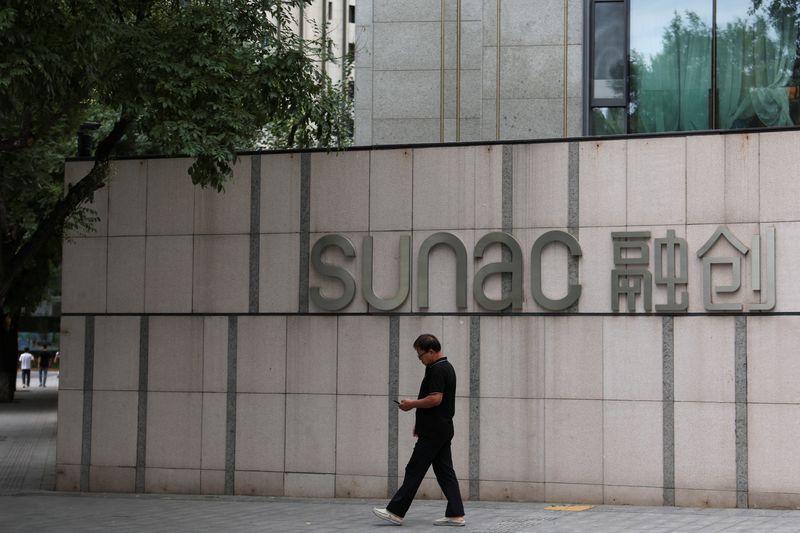By Clare Jim
HONG KONG (Reuters) – Progress by Chinese property developer Sunac towards a landmark restructuring deal for yuan bonds could open the gates to a flurry of debt agreements next year, as the sector gives up on returning to financial health anytime soon.
Hit with a liquidity crisis since 2021, China’s highly indebted developers began tackling the restructuring of offshore bonds in 2022. But for politically sensitive onshore bonds, they have repeatedly extended maturities, pinning their hopes on a pickup in cashflow.
That practice no longer seems viable given the prolonged weakness in housing demand and the broader economy, industry officials and analysts say.
Logan Group plans to restructure all of its onshore bonds in 2025, said a person briefed by the company. The Shenzhen-based real estate development firm faces repayments of 2.4 billion yuan ($330 million) next year, according to LSEG data.
It aims to start discussions with bondholders in January and gain approval in March, the person said, adding that the proposal will ask bondholders to take huge losses.
Shanghai-based CIFI Holdings, a large property developer due to repay bondholders 3.1 billion yuan in 2025, is also considering a debt revamp, a separate source briefed by CIFI said. But much would depend on whether Sunac is successful in securing a deal, the source added.
The sources were not authorised to speak to the media and declined to be identified. Logan and CIFI did not respond to Reuters requests for comment.
The two are among many developers with bond payments due next year. For example, embattled Country Garden (HK:), the country’s No. 2 private property developer, is expected to repay onshore creditors 6.6 billion yuan next year. Country Garden, based in Guangdong province, declined to comment on its debt repayment plans.
Though authorities have sought to bolster the sector with a range of measures such as cutting mortgage rates and minimum down-payment ratios, fundamentals for most developers have not changed much in the past three years.
“There’s no new liquidity and no new lending and sales haven’t improved,” said Glen Ho, national turnaround & restructuring leader at Deloitte.
“The focus for 2025 will be onshore debt restructuring,” he added.
SUNAC – THE LITMUS TEST
Beijing-based Sunac has said it plans to cut $2.1 billion worth of onshore bond debt by more than half. Last week it secured sufficient support from bondholders for two of the 10 bonds it aims to restructure, a source has said.
But Sunac will need to gain sufficient approval from holders of all 10 bonds for the deal to move ahead. The voting deadline for the other eight has been delayed till Dec. 23 and if Sunac is successful, it will mark the first company-led restructuring of yuan debt with steep haircuts in the property sector.
“I don’t think it’s going to be easy for Sunac to get all bondholders to sign off on the deal,” said a senior executive at a property developer who declined to be named because of the sensitivity of the issue. “Every developer is watching. If it manages to cut debt, we’ll want to do it too.”
Foreky Wong, founding partner of advisory firm Fortune Ark Restructuring, said Sunac’s proposal to bondholders suggests authorities are no longer against onshore creditors taking on some of the property developers’ pain.
“It shows onshore creditors will also need to help the sector’s deleveraging by taking losses,” he said.
The Chinese Securities Regulatory Commission did not respond to a request for comment.
Chinese real estate developers had total liabilities of roughly $12 trillion in 2023, according to an estimate by China’s National Bureau of Statistics. That figure includes all kinds of debt including loans, trust and payables, as well as onshore and offshore liabilities.

In general, the property sector has more onshore debt than offshore debt. Onshore debt tends to be held by a range of investors from state insurers to private asset managers.
($1 = 7.2816 )
#AnalysisChinese #property #developers #bite #bullet #revamp #onshore #debt #Reuters